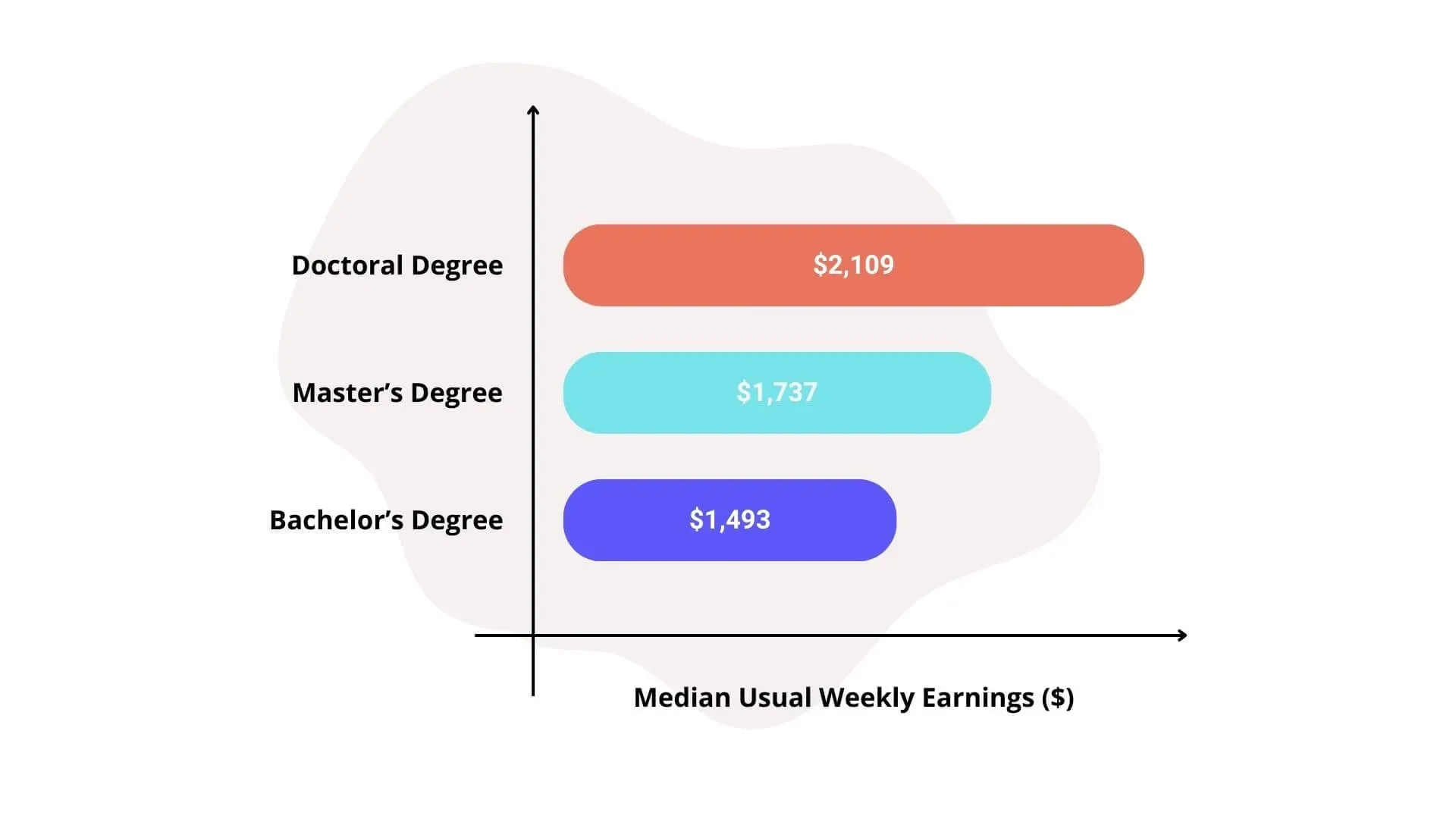The Key Difference Between Undergraduate and Graduate


Is it worth shelling out the extra time and money to go to grad school? The answer depends on your career goals and intended field of study.
The difference between undergraduate and graduate school basically boils down to career prospects: certain professions require a graduate degree, while you can work in other fields with just a bachelor's.
As a survivor of academia, I can tell you that the daily grind of attending lectures and studying for exams can be stressful— graduate school isn't for everyone. But if you have a particular goal in mind, like attending medical school, you'll be rewarded for your hard work.

There's a notable salary difference between undergraduate and graduate salaries. According to the U.S. Bureau of Labor Statistics, the median weekly earnings for those with bachelor's degrees are $1,493. For those with a master's degree, the average weekly earnings are $1,737.
Considering that wage gap, it's worthwhile to take some time and decide on a tentative plan for your future. That way, you won't waste time or money on a degree you don't actually need. Read through the pros and cons of a graduate and undergraduate degree to see what's the better fit for you.
Create Your Free Profile to Apply for College Scholarships Today!Consider these questions to determine your best fit:
- Career Goals: What are your long-term career aspirations? Some professions require advanced degrees. The typical graduate student has a specific profession in mind.
- Interest in Specialization: Are you passionate about diving deep into a specific field?
- Time and Financial Investment: Can you commit to the time and cost associated with graduate programs?

As a college student, you probably either have a clear goal in mind, such as a specific profession you want to pursue, or you're undecided. For those of you with clear goals, the answer's easy— if your profession requires an advanced degree, grad school is the right answer.
If you're undecided, that's fine too. Keep your options open by attaining an undergraduate degree that leaves room for graduate studies. For example, a general degree like a bachelor's in Psychology gives you several career paths: counseling, advertising, market research, human resources, and more.
A degree like Psychology is also easy to build on in graduate school, as you could pursue clinical aspirations with a PhD or other advanced degree, allowing you to work in the medical field.
An undergraduate degree can be expensive. Create your Bold profile today to start applying for scholarships today! Find hundreds of scholarships you’re eligible for, all in one place.

Undergraduate Education
Admission Requirements for an Undergraduate Program
To pursue an undergraduate degree, prospective students need to meet specific admission requirements. These criteria ensure that students are adequately prepared for the rigors of undergraduate studies.
Whether you're seeking admission or a few years into the program, apply for undergraduate scholarships now to make sure you can finish your degree!
High School Graduation Requirements
A high school diploma is the fundamental prerequisite for most undergraduate programs. High school coursework should ideally include a balanced mix of subjects:
- English: 4 years
- Mathematics: 3-4 years
- Science: 3 years
- Social Studies: 3 years
- Foreign Language: 2-3 years
These courses build a solid foundation in essential academic skills and knowledge areas.
Standardized Tests (SAT/ACT)
Standardized tests like the SAT or ACT are commonly required for aspiring undergraduate students. These tests assess a student's readiness for college-level work:
- SAT: Measures proficiency in critical reading, mathematics, and writing. The test is scored on a scale of 400 to 1600.
- ACT: Covers English, mathematics, reading, science reasoning, and an optional writing section. Scored on a scale from 1 to 36.
There are many financial aid opportunities available for those pursuing an undergraduate degree. Check out this list of scholarships for undergraduate students and apply to any you're eligible for.
Career Opportunities with an Undergraduate Degree
Undergraduate programs equip students with essential transferable skills that are highly valued by employers across various sectors. These skills include:
- Critical Thinking and Problem-Solving
- Communication Skills
- Teamwork and Collaboration
- Time Management
A degree in computer science can lead to roles such as software developer or IT consultant, while a psychology major might find opportunities in human resources or counseling.
These foundational skills serve as the cornerstone for future professional growth and career advancement. It's easy to take an undergraduate degree and add to it, for example, with a degree in nursing. Earn nursing scholarships or other types of scholarships to continue your education!
View our full range of exclusive scholarships to make sure you aren’t missing out on any financial opportunities!

Graduate Education
Admission Requirements for a Graduate Degree
When you're considering a graduate degree, it's important to know what the admission requirements are. These requirements can vary, but they generally include a few main things:
Bachelor's Degree Requirement
Most graduate programs will require you to have a bachelor's degree from an accredited school.
Minimum GPA and Standardized Tests (GRE/TOEFL)
- Minimum GPA: Many graduate schools have a minimum GPA requirement, usually around 3.0 on a 4.0 scale.
- Standardized Tests: A lot of graduate programs also ask for scores from standardized tests as part of the application process. The two most common ones are:
- GRE (Graduate Record Examination): This test measures your verbal reasoning, quantitative reasoning, and analytical writing skills.
- TOEFL (Test of English as a Foreign Language): If English isn't your first language, then you might need to take the TOEFL to show that you're proficient in English and can handle studying in an English-speaking environment.
Depending on the program, there might be some additional things you need to submit with your application:
- Letters of Recommendation: These are usually written by professors or professionals who can talk about your qualifications and potential for success in grad school.
- Personal Statement or Statement of Purpose: This is an essay where you explain why you want to get a graduate degree, what your career goals are, and how the program you're applying to fits into all of that.
- Resume/CV: This is a detailed list of your academic achievements, work experience, research projects, publications, and any other relevant things you've done.
Graduate-Level Courses and Study Habits
A graduate program is designed to offer an in-depth study within a specific field. Unlike undergraduate courses, which often cover a broad range of topics, graduate courses focus on specialized knowledge and advanced theories.
Graduate school is often more specialized and academically rigorous than undergraduate institutions. Read here for an in-depth guide on what graduate school covers.
Graduate students dive deep into their chosen disciplines. Whether pursuing a master's degree or a doctoral degree, the coursework is tailored to develop expertise and critical understanding. Graduate classes might include:
- Seminars: Small group discussions focused on specific topics.
- Advanced Lectures: Detailed explorations of niche subjects.
- Practicums: Hands-on experiences directly related to the field of study.
Research-Oriented Coursework:
Graduate studies emphasize research as a core component. Students engage in research-oriented coursework that builds their ability to conduct independent investigations. This includes:
- Literature Reviews: Comprehensive analyses of existing research.
- Methodology Classes: Training in research methods and techniques.
- Original Research Projects: Opportunities to contribute new knowledge to the field.
Graduate degree programs offer more than just advanced knowledge; they prepare students for leadership roles and specialized careers.
Depending on the program you choose, graduate school can be long and costly. Make use of scholarships to raise money for your education! Graduate students should apply for graduate scholarships today to avoid missing financial aid opportunities.

Research and Thesis/Capstone Projects
Graduate degrees often require students to engage in significant research, culminating in a thesis or capstone project. These projects serve to demonstrate the graduate student's mastery of their field, as well as their ability to conduct independent research.
For example, a master's student in Computer Science might develop a new software application to address an industry problem.
In master's degree programs, the thesis often focuses on applying existing knowledge to solve specific problems. Doctoral degrees, however, require original contributions to the field, reflecting a deeper level of inquiry and innovation.
Advantages of Pursuing a Master's Degree over a Bachelor's Degree
Pursuing a master's degree offers numerous advantages that can significantly impact your career trajectory. Graduate students often experience enhanced job prospects and earning potential compared to those holding only an undergraduate degree.
1. Opportunities for Leadership Roles
Graduate programs are designed to cultivate specialized knowledge and advanced skills within a specific field. This expertise often translates into leadership opportunities, as employers seek individuals who can lead projects and teams effectively.
2. Increased Job Prospects and Earning Potential
A graduate degree opens doors to career opportunities that may not be accessible with just an undergraduate education. Many industries value the depth of knowledge and commitment demonstrated by those who pursue graduate studies. This recognition often results in higher salaries and more competitive job offers.
3. Advanced Skills and Specialization
Specialization in niche fields is highly sought after, as it indicates a thorough understanding of complex concepts and the ability to apply this knowledge practically.
4. Networking Opportunities
Graduate school provides a unique environment for building professional networks. Engaging with faculty members, attending industry conferences, and collaborating on research projects offer invaluable connections that can benefit your future career.

Frequently Asked Questions About Graduate and Undergraduate Degrees
What is the main difference between undergraduate and graduate education?
As an undergraduate student, you'll explore diverse subjects, laying the groundwork for your future. Graduate education delves deeper into specialized fields, emphasizing advanced study, research, and expertise.
What is the difference between a master's degree and a doctoral degree?
- Master's Degree: Typically requires 1-2 years of study beyond a bachelor's degree. It focuses on advanced knowledge and skills in a specific discipline.
- Doctoral Degree: The highest academic degree, usually requiring 3-7 years of study post-master's level. It involves conducting original research and contributing new knowledge to the field.
Is graduate school more difficult than pursuing an undergraduate program?
Graduate school can be more challenging due to its intensive focus on specialized subjects, rigorous academic standards, and research requirements. Graduate students often engage in complex projects and must exhibit a higher level of self-discipline and critical thinking compared to undergraduate degrees.
At Bold.org, we are committed to connecting students with free resources. For more information regarding scholarship opportunities, browse our Scholarship Blog today!

About Elise
Elise is a skilled and knowledgeable writer. Her understanding of scholarships and internships enables her to craft insightful and informative content that resonates with students, helping them navigate the often complex processes of applying for financial aid and career opportunities.
Elise graduated from New York University with a double major in English and Psychology, as well as a minor in Creative Writing.
Experience
Through challenging university coursework and corporate experience, Elise has become an expert in several different types of writing, including literary analysis, content pieces, formal scientific writing, SEO editing, and more. Elise expanded on her knowledge while interning in marketing, using her understanding of SEO to boost website traffic and customer engagement.
She’s published a short story in The Foundationalist literary magazine and has also won several short story writing awards at the regional and international levels. Elise loves to craft content that helps students navigate college life and scholarship applications. She makes use of syntax and tone to write readable, engaging pieces. Elise has a solid understanding of linguistics and grammatical structures across multiple languages, thanks to her fluency in English and proficiency in Mandarin and Cantonese.
Elise first joined Bold.org in 2022 during her undergraduate studies, explored other pursuits in 2023, and happily returned in 2024. Motivated by her writing skills, she aims to make educational resources more accessible for students of all backgrounds. Additionally, she believes it's important to add to the available information on student loans and student finances in a way that's user-friendly and easy to understand.
Quote from Elise
“I try to create content that would have helped my younger self— stuff I wish I knew when I was starting college.”